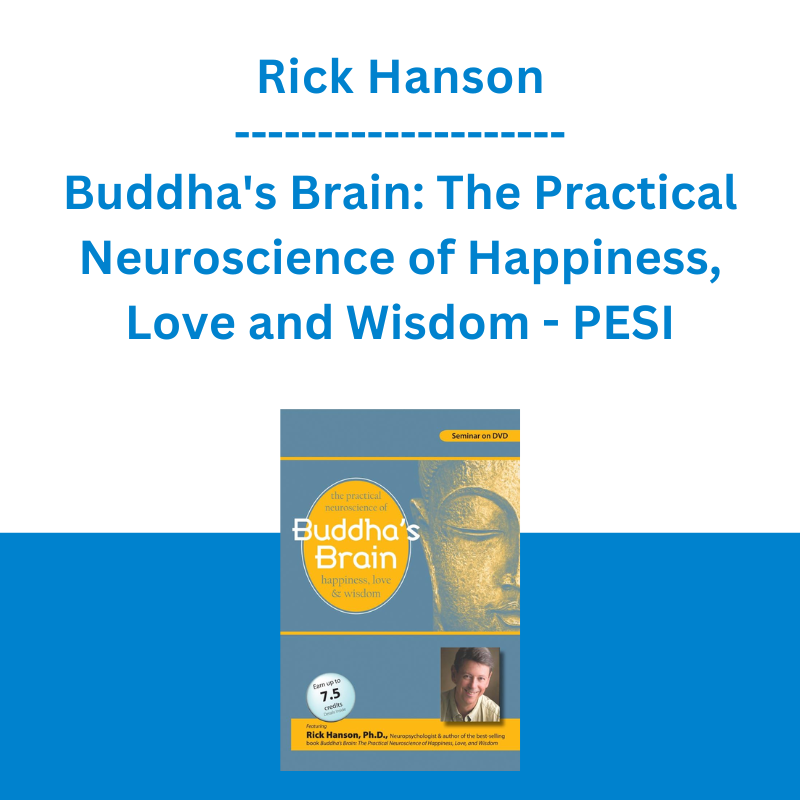*** Proof of Product ***
Exploring the Essential Features of “Rick Hanson – Buddha’s Brain: The Practical Neuroscience of Happiness, Love and Wisdom – PESI”
Speaker: Rick Hanson, Ph.D.
Format: Audio and Video
Media Type: Digital Seminar
Description
Featuring Rick Hanson, Ph.D.
Neuropsychologist & author of the best-selling book Buddha’s Brain: The Practical Neuroscience of Happiness, Love and Wisdom
- 4 steps to internalize positive experiences and heal pain and dysfunction
- Learn from the “Olympic athletes” of brain training (lessons from 2,500 years of contemplative practice)
- Understand the brain’s negativity bias, the greatest challenge in psychotherapy
- Work with the brain’s 3 motivational systems (Approach, Attach, Avoid)
- Strengthen the neural circuits of contentment, belonging and peace
- Teach clients self-directed neuroplasticity
Today’s unprecedented meeting of modern brain science and ancient contemplative wisdom offers you powerful new tools for changing the neural wiring and neurochemistry of the brain.
In this seminar, learn how to use contemplative neuroscience in down-to-earth ways to…
- Weave positive experiences into the fabric of the brain and self
- Stimulate and strengthen the neural circuits of empathy
- Help clients become more mindful
Speaker
Rick Hanson, Ph.D., is a psychologist, a Senior Fellow of the Greater Good Science Center at UC Berkley, and a New York Times best-selling author. His books are available in 26 languages and include Hardwiring Happiness (Harmony, 2016), Buddha’s Brain (New Harbinger, 2009), Just One Thing Card Deck (PESI, 2018), and Mother Nurture (Penguin, 2002). He edits the Wise Brain Bulletin and has numerous audio programs. A summa cum laude graduate of UCLA and founder of the Wellspring Institute for Neuroscience and Contemplative Wisdom, he’s been an invited speaker at NASA, Oxford, Stanford, Harvard, and other major universities, and taught in meditation centers worldwide.
Dr. Hanson has been a trustee of Saybrook University, served on the board of Spirit Rock Meditation Center, and was President of the Board of FamilyWorks, a community agency. He began meditating in 1974, trained in several traditions, and leads a weekly meditation gathering in San Rafael, California. His work has been featured on the BBC, CBS, and NPR, and he offers the free Just One Thing newsletter with over 114,000 subscribers, plus the online Foundations of Well-Being program in positive neuroplasticity.
He enjoys rock-climbing and taking a break from emails. He and his wife have two adult children.
Speaker Disclosures:
Financial: Dr. Rick Hanson maintains a private practice and receives royalties as a published author. He receives a speaker honorarium, recording, and book royalties from Psychotherapy Networker and PESI, Inc. He has no relevant financial relationships with ineligible organizations.
Non-financial: Dr. Rick Hanson is a member of the International Positive Psychology Association, the American Psychological Association, the American Association for the Advancement of Science, and the American Mindfulness Research Association.
Target Audience
Counselors, Psychologists, Case Managers, Psychotherapists, Social Workers, Marriage & Family Therapists, Addiction Counselors, Therapists, Nurses, Occupational Therapy Assistants, Other Mental Health Professionals
Objectives
- Describe major mechanisms of neuroplasticity.
- Explain how to build self-compassion into the brain.
- Describe the evolutionary basis of the brain’s negativity bias.
- Summarize the three basic steps of “taking in the good” (TIG).
- Integrate the fourth step of TIG to heal painful experiences.
- Explain how to activate contentment, belonging and peace.
Outline
- The Promise of Self-Directed Neuroplasticity
How the mind changes the brain
Lessons from 2,500 years of meditative practice
Neural circuits of self-compassion
Getting on your own side
Virtue, mindfulness and wisdom—resting on the neural functions of regulating, learning and selecting - The Challenge of Evolution
Chasing carrots and dodging sticks
The negativity bias of the brain
How that bias undermines psychotherapy - The Power of Implicit Memory
Memory systems, explicit and implicit
The importance of inner resources
Factors of neuroplasticity - Taking in the Good
Turning good facts into good experiences
Savoring positive emotions and perspectives
Priming implicit memory systems
Working with children
Why it’s good to feel good
Living gratefully - Clearing Old Pain
Exploiting the “weak link” in memory consolidation
Pairing positive experiences with old pain
Special considerations for trauma - Natural Happiness
The resting state of the brain: Calm, contented, caring
The brain’s three motivational systems: Approach, Attach, Avoid
The reactive mode of greed, heartache and hatred (broadly defined)
How to build up the neural circuits of the responsive mode of gladness, love and peace
Please see the full list of alternative group-buy courses available here: https://lunacourse.com/shop/










 Erik Banks - Alternative Risk Transfer
Erik Banks - Alternative Risk Transfer